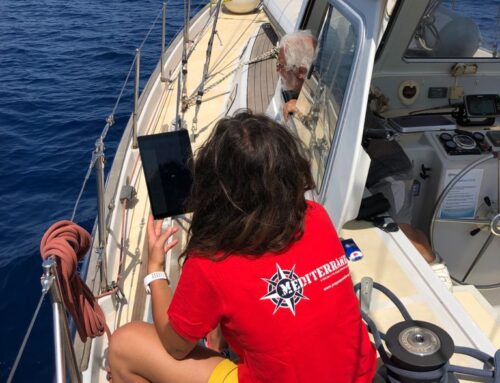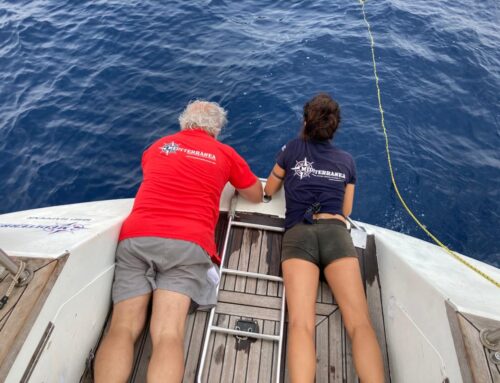
Some meetings you try to arrange, but it is not always easy, because the Mediterranea is in Athens and the person we want to meet is abroad, away from Greece. Prof. Nikos G. Moschonas, Director Emeritus of the Byzantine Research Institute of the National Greek Foundation of Research, replies to the questions of Simone Perotti by e-mail. Here is the transcript:
Perotti: You speak ancient Greek using it as a filter, an interface which gathers the light of the East to illuminate the West. A beautiful image. Today we should perhaps have Countries and cultures that are able to take light from the South to illuminate the North. Or vice versa, depending on how you see it. Do you think that it is possible? That it is necessary? And who could be a candidate for this role?
Moschonas: Studying the historical past has shown us that not all peoples have walked in simultaneously and in small equal steps towards civilization. For some evolution was precocious and progressed more rapidly; others, on the other hand, were late in taking this path and remained for a very long time in backward phases, until they came into contact – either violently or pacifically – with other more advanced populations. The environment, geo-morphological and climatic conditions, were the main factors that determined the process of evolution. Right from very ancient times, the Mediterranean – starting from its Eastern basin – has undoubtedly been the cradle of many great civilizations, and their triumphs were passed on to other populations who came within their cultural influence. Today, the world is experiencing the process of cultural globalisation. This means that everything that is produced, everything that is created anywhere in the world, each natural, technological, cultural or spiritual product, each and every breakthrough in any field of science, can and must go to the common good of all populations. And all populations have a right to it, given that they participate in common progress. At the same time, each and every population has the right to defend its culture, preserving all those aspects which do not go against the well-being, peace and progress of humanity. We, who as Mediterranean populations, have the longest and most abundant experience of History, can (and perhaps must) spread the spirit of brotherhood, solidarity and peace towards the North, putting aside differences in culture and mentality and calming disastrous aversions.
P: What do you think of the concept of Mediterranean Citizenship which is the cornerstone of our project? Defining ourselves, as we do, “citizens of the Mediterranean of Italian culture”, or Greek, or Arab culture, do you believe that this has any meaning? Can a true, shared, recognisable citizenship of the Mediterranean exist, today or in a distant future?
M: A possible Mediterranean citizenship could effectively remove today’s difficulties, which stem from belonging to different countries and cultures. But before speaking of “Mediterranean citizenship” I believe that one must think in terms of “building” a “Mediterranean conscience”. We live along the coasts of a sea that has nurtured many populations of different origin; populations that belong to three of the five human races and believe in three of the most important religions. Over the centuries these populations have lived together exchanging ideas and cultures, but they have also lived through tragic moments. The awareness of belonging to a Mediterranean community where, despite our differences, or better, thanks to these differences, each Country contributes to creating a polyvalent Mediterranean culture, is the fundamental condition of a true Mediterranean citizenship in the future.
P: It is increasingly evident, above all considering the behaviour of some financial and political institutions, that in the Mediterranean there is a radical and frequent separation between the concepts of justice and legality. Very often, seeing the taxes and restrictions imposed on some member states of the European Union, it would seem that in order to attain justice one must move in territories that have nothing to do with the concept of legality? What do you think of this? Is it dangerous to pursue this path of interpretation?
M: I believe that one cannot discuss this problem in the same way for the Mediterranean as a whole. On the other hand, it isn’t as if these separations do not occur even in other European countries, which are not along our coasts.
P: Those who lose their lives today in the Mediterranean Sea seem to be foreigners who want to enter Europe, but often they are fellow citizens who are moving in the common basin of the Mediterranean. I believe that Future history will blame us for a deep and cruel negligence in the management of the plague of immigration. In very much the same way as German citizens were blamed in the post-war period for not doing anything to prevent the exterminations, they could not have not known. What do you think of our responsibility with respect to the holocaust of migrations?
M: Initially, yes, it was our Mediterranean “fellow citizens” who wanted to migrate to European countries, in order to survive; and with this I mean the populations of the Balkans and North Africa, who were later joined by refugees from the Middle East and more recently those from the tragic situation in Syria today. In addition to all this, there are continuous waves of emigrants from African and Asian countries who live in poverty and suffer the cruelty of totalitarian governments or whose countries are continuously at war (Giuseppe Catozzella, in his last book “Non dirmi che hai paura” (Don’t tell me you are afraid), Feltrinelli 2014, writes of the tragic escape to liberty of the young Somali athlete Samia Yusuf Omar. Death awaited her in the waters of Lampedusa). Yes, the Western world has its responsibilities because it continues to be indifferent or even supports totalitarian governments, it sells arms and fosters civil wars, or destroys Countries with its own weapons by exporting wars in the name of civilization. And other Mediterranean Countries who facilitate, with their tolerance and indifference those who horrifically trade on the hopes of emigrants, have a responsibility. Southern European countries offer their help, but are unable to take in the millions of immigrants, while Northern countries adopt measures against immigration. Moreover, many of our fellow citizens are guilty of exploiting immigrants, at times in an inhuman manner. History will very have to judge all this very gravely. But the problem must be resolved before that moment in History arrives.





Leave A Comment